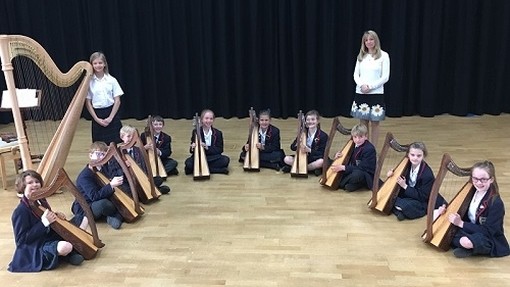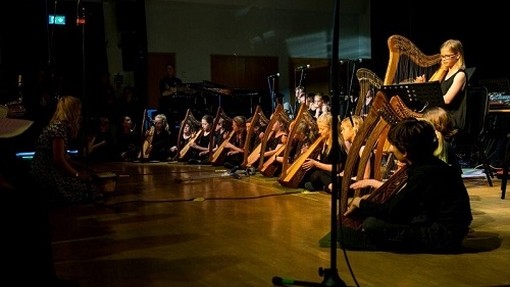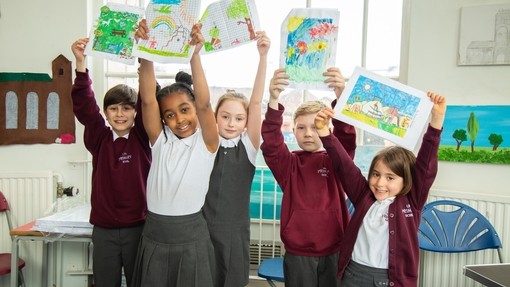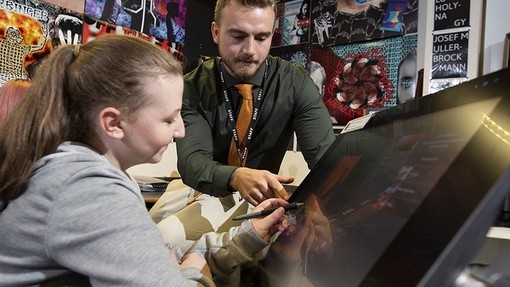
Rosie Gill, a Year 9 student at Ballard School, is one of the youngest people to achieve Distinction as an associate of the Royal School of Music and Trinity Music College. Victoria Gray, Director of Music and Performing Arts, introduces us to Rosie and tells us how she inspired a mentoring programme that helped the school on their journey to Artsmark Gold…
Ballard School in a small Independent school on the edge of the New Forest, with just under 400 students aged 2-16 years. We pride ourselves on our holistic approach to education, in particular, the provision within the Performing Arts at all stages of the school.
At Ballard, we are passionate about the vital role arts education plays in the lives of all young people. Artsmark helps us to reinforce and protect the importance of the arts in everyday life at Ballard. It has inspired us to examine our provision and set targets to improve, adapt and keep moving with the times!

Nurturing young people’s talents and developing peer-to-peer learning played a huge part in our Artsmark journey. This was inspired by our student body, who have always been in awe watching Rosie play the harp and inquisitive of how it works. So we approached our Parents’ Association, Friends of Ballard School, who generously funded the purchase of 10 Celtic Harps to enable us to set up the club, led by our very own Rosie.
Rosie’s Ensemble proved very popular and they now run twice a week. Watching our younger students enjoy, spend time with and learn from the older ones is a joy to see and really adds to the ‘family’ ethos of Ballard. We want our students to have ownership of our arts activities, and we run similar mentoring programmes in Drama and Performing Arts, which has had a hugely positive impact.
Besides the immediate social benefits, mentoring is a great way of reinforcing learning for students. Working out how to communicate and explain concepts and new skills tests their own understanding. Creativity, planning, problem solving, time management and discipline - essential skills that are beneficial way beyond the immediate environment of the activity – are all challenged and built on through the process of mentoring and teaching others.
My advice on starting a mentoring programme? Deliver a very specific section of a teacher led activity or work with specific individuals as a starting point. Some pupils are naturals while others will take a while to find their feet working with younger pupils. It can be a great way to build self-esteem and engage pupils who may find it hard to fit in with their own peer group. Likewise, younger pupils who may be struggling can benefit hugely from a big sister/brother relationship with someone who shares the same interests and hobbies.

Here’s what Rosie had to say about her experience as a mentor:
What do you love most about teaching other students?
I love giving students the opportunity to touch, feel and play a harp and I love witnessing their satisfaction when they create a beautiful melody. The pupils find it really calming and always wish to stay longer.
How do you plan and teach your classes?
The most fun part is choosing the repertoire. I enjoy rearranging harp pieces for these specific knee harps with only 19 strings. It can be challenging as there is hardly any music published for them and especially not for an ensemble. I try to arrange around three different harmonies that can play along to my accompaniment on a full-sized lever harp. We meet once a week and aim to perform a piece at the end of each term.
My mum keeps order as the adult authoritarian as she is a peripatetic piano teacher at the school. I take the children in little groups and teach them the melodies I have created. We then come together at the end of the class and play the piece all together. It’s wonderful when all the parts harmonise. It makes such a beautiful sound.
What has teaching the harp to others taught you?
It has taught me that not everyone finds the harp easy to play. Everyone comes with different abilities and I really enjoy seeing those that find it tricky at first eventually achieve. Little things I take for granted - such as the positioning of the harp or the finger positions - come to light and I have to learn to verbalise how they need to do things.
I have great admiration for the teachers at my school; I can see the more experience I gain the better I will become as a teacher.
And finally, what does the future hold for you as a musician?
I am given such wonderful international opportunities as a young harpist because I have gained a high standard for my age. My priority though is my school education at Ballard and in between I perform all over the country solo concerts. I aim to go to a Music conservatoire in Europe and become a solo harpist.
Rosie was recently featured on BBC News, click here to watch her in action.


